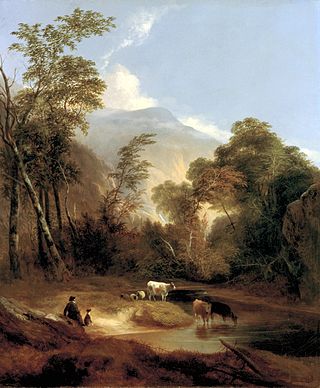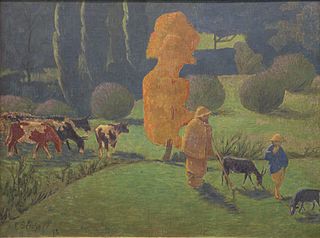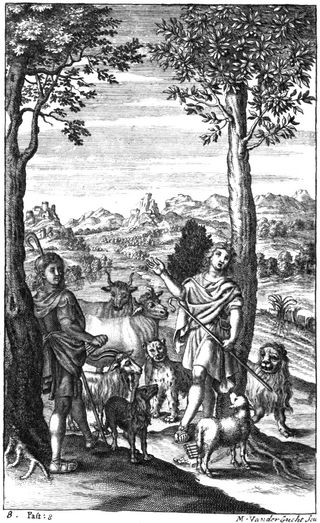
Publius Vergilius Maro, usually called Virgil or Vergil in English, was an ancient Roman poet of the Augustan period. He composed three of the most famous poems in Latin literature: the Eclogues, the Georgics, and the epic Aeneid. A number of minor poems, collected in the Appendix Vergiliana, were attributed to him in ancient times, but modern scholars consider his authorship of these poems to be dubious.

Theocritus was a Greek poet from Sicily, Magna Graecia, and the creator of Ancient Greek pastoral poetry.

The pastoral genre of literature, art, or music depicts an idealised form of the shepherd's lifestyle – herding livestock around open areas of land according to the seasons and the changing availability of water and pasture. The target audience is typically an urban one. A pastoral is a work of this genre. A piece of music in the genre is usually referred to as a pastorale.
An eclogue is a poem in a classical style on a pastoral subject. Poems in the genre are sometimes also called bucolics. The term is also used for a musical genre thought of as evoking a pastoral scene.
Titus Calpurnius Siculus was a Roman bucolic poet. Eleven eclogues have been handed down to us under his name, of which the last four, from metrical considerations and express manuscript testimony, are now generally attributed to Nemesianus, who lived in the time of the emperor Carus and his sons. The separate authorship of the eclogues of Calpurnius and Nemesianus was established by Haupt.

The Eclogues, also called the Bucolics, is the first of the three major works of the Latin poet Virgil.

Corydon is a stock name for a herdsman in ancient Greek pastoral poems and fables, and in much later European literature.
The Eclogues is a collection of Latin poetry attributed to Calpurnius Siculus and inspired by the similarly named poems of the Augustan-age poet Virgil.
The Eclogues is a book of four Latin poems, attributed to Marcus Aurelius Olympius Nemesianus.
Anser was a minor poet of ancient Rome who lived in the 1st century BC. He is mentioned by Ovid as a writer of love poetry associated with Catullus, Calvus and Cinna. According to the 4th-century AD grammarian Servius, he was a "very bad poet" who wrote in praise of the triumvir Mark Antony and was a detractor of Virgil. None of his work is known to have survived.
Idyll I, sometimes called Θύρσις ('Thyrsis'), is a bucolic poem by the 3rd-century BC Greek poet Theocritus which takes the form of a dialogue between two rustics in a pastoral setting. Thyrsis meets a goatherd in a shady place beside a spring, and at his invitation sings the story of Daphnis. This ideal hero of Greek pastoral song had won for his bride the fairest of the Nymphs. Confident in the strength of his passion, he boasted that Love could never subdue him to a new affection. Love avenged himself by making Daphnis desire a strange maiden, but to this temptation he never yielded, and so died a constant lover. The song tells how the cattle and the wild things of the wood bewailed him, how Hermes and Priapus gave him counsel in vain, and how with his last breath he retorted the taunts of Aphrodite.

Eclogue 1 is a bucolic poem by the Latin poet Virgil from his Eclogues. In this poem, which is in the form of a dialogue, Virgil contrasts the diverse fortunes of two farmers, Tityrus, an old man whose lands and liberty have been restored to him thanks to the intervention of an unnamed young man, and Meliboeus, who has been forced off his land, which is due to be given to a soldier. It is generally assumed that the poem refers to the confiscations of land that took place around Virgil's home town of Mantua in 41 BC in order to settle retired soldiers after the civil war. The poem has 83 lines, and is written in the dactylic hexameter metre.

Eclogue 2 is a pastoral poem by the Latin poet Virgil, one of a series of ten poems known as the Eclogues. In this Eclogue the herdsman Corydon laments his inability to win the affections of the young Alexis. It is an imitation of the eleventh Idyll of Theocritus, in which the Cyclops Polyphemus laments the cruelty of the sea-nymph Galatea. After a 5-line introduction, the rest of the poem consists of a single speech by Corydon. The poem has 73 lines, and is written in the dactylic hexameter metre.

Eclogue 3 is a pastoral poem by the Latin poet Virgil, one of a collection of ten poems known as the "Eclogues". This eclogue represents the rivalry in song of two herdsmen, Menalcas and Damoetas. After trading insults, the two men decide to have a singing competition, for which each offers a prize. A neighbour, Palaemon, who comes along by chance, agrees to be the judge. The second half of the poem consists of the contest, in which each of the two competitors in turn sings a couplet and the other caps it with another couplet. In the end Palaemon brings the contest to an end and declares it a draw.
Eclogue 5 is a pastoral poem by the Latin poet Virgil, one of his book of ten poems known as the Eclogues. In form, this is an expansion of the first Idyll of Theocritus, which contains a song about the death of the semi-divine herdsman Daphnis. In the first half of Virgil's poem, the goatherd Mopsus sings a song lamenting the death of Daphnis; in the second half, his friend Menalcas sings a song of equal length telling of Daphnis' welcome among the gods, and the rites paid to him as a divinity.

Eclogue 8, also titled Pharmaceutria, is a pastoral poem by the Latin poet Virgil, one of his book of ten Eclogues. After an introduction, containing an address to an unnamed dedicatee, there follow two love songs of equal length sung by two herdsmen, Damon and Alphesiboeus. One is the song of a love-sick young man, whose girlfriend Nysa is marrying another man, Mopsus. The second is the song of a woman who, with the help of her servant Amaryllis, is performing a magic rite to try to entice her beloved Daphnis back from the city.

Eclogue 9 is a pastoral poem by the Latin poet Virgil, one of his series of ten poems known as the Eclogues. This eclogue describes the meeting of two countrymen Lycidas and Moeris. Moeris has been turned out of his farm and is taking some kid goats to town for the new occupant; young Lycidas is astonished, for he had heard that Menalcas had secured the safety of the district by his poetry, but Moeris replies that, so far from that being so, he and Menalcas himself had barely escaped with their lives: they then proceed to recall passages of Menalcas' poetry. Lycidas wants to continue singing to lighten the journey but the distressed Moeris begs him to cease, promising that they will sing again when Menalcas returns.
Eclogue 10 is a pastoral poem by the Latin poet Virgil, the last of his book of ten poems known as the Eclogues written approximately 42–39 BC. The tenth Eclogue describes how Cornelius Gallus, a Roman officer on active service, having been jilted by his girlfriend Lycoris, is imagined as an Arcadian shepherd, and either bewails his lot or seeks distraction in hunting "with the Nymphs" amid "Parthenian glades" and "hurling Cydonian arrows from a Parthian bow".

Idyll V, sometimes called Αιπολικόν και Ποιμενικόν, is a bucolic poem by the 3rd-century BC Greek poet Theocritus. This Idyll begins with a ribald debate between two hirelings, who, at last, compete with each other in a match of pastoral song. The scene is in Southern Italy.
Idyll IV, also titled Νομεῖς, is a bucolic poem by the 3rd-century BC Greek poet Theocritus. The poem is a conversation between a goatherd named Battus and his fellow goatherd Corydon, who is acting oxherd in place of a certain Aegon who has been persuaded by one Milon son of Lampriadas to go and compete in a boxing-match at Olympia. Corydon's temporary rise in rank gives occasion for some friendly banter, varied with bitter references to Milon's having supplanted Battus in the favours of Amaryllis.





















